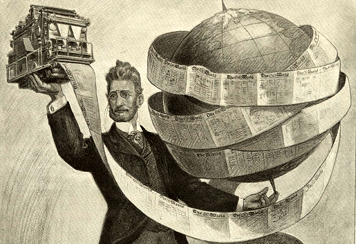“Joseph Pulitzer and The World,” an Exhibition in the Rare Book & Manuscript Library, Butler Library, 6th Floor East, Columbia University
To celebrate the publication of James McGrath Morris’s new biography of Joseph Pulitzer, Pulitzer: A Life in Politics, Print, and Power (HarperCollins, 2010), the Rare Book and Manuscript Library, Butler Library, 6th Floor East, is presenting an exhibition of the papers of Joseph Pulitzer and of his newspaper, The World, held by the RBML. The exhibition contains a variety of materials that show the working life of this truly remarkable individual. On display are letters, documents, ledgers, newspapers, photographs, and realia concerning his life, as well as material documenting Pulitzer’s role in the founding of Columbia’s School of Journalism and the creation of the Pulitzer Prizes. Running through July, this is the first time that this material has been shown to the public.
James McGrath Morris is the author of Pulitzer: A Life in Politics, Print, and Power (HarperCollins, 2010) His previous book, The Rose Man of Sing Sing: A True Tale of Life, Murder, and Redemption in the Age of Yellow Journalism, was selected as a Washington Post Best Book of the Year for 2004. He has written for The Washington Post, The New York Observer, The Progressive, Civilization, and The Wilson Quarterly.
Exhibit Curator
Jennifer B. Lee
Joseph Pulitzer & Family »
Like Alfred Nobel, Joseph Pulitzer is better known today for the prize that bears his name than for his contribution to history. This is a shame. In the nineteenth century, when American became an industrial nation and Carnegie provided the steel, Rockefeller the oil, Morgan the money, and Vanderbilt the railroads, Joseph Pulitzer was the midwife to the birth of the modern mass media. What he accomplished was as significant in his time as the creation of television would be in the twentieth century, and it remains deeply relevant in today’s information age.
Pulitzer’s lasting achievement was to transform American journalism into a medium of mass consumption and immense influence. He accomplished this by being the first media lord to recognize the vast social changes that the industrial revolution triggered, and by harnessing all the converging elements of entertainment, technology, business, and demographics. This accomplishment alone would make him worthy of a biography.
His fascinating life, however, makes him an irresistible subject. Ted Turner-like in his innovative abilities, Teddy Roosevelt-like in his power to transform history, and Howard Hughes-like in the reclusive second half of his life as a blind man tormented by sound, Pulitzer’s tale provides all the elements of a life story that is important, timely, and compelling.
James McGrath Morris
Pulitzer: A Life in Politics, Print, and Power
